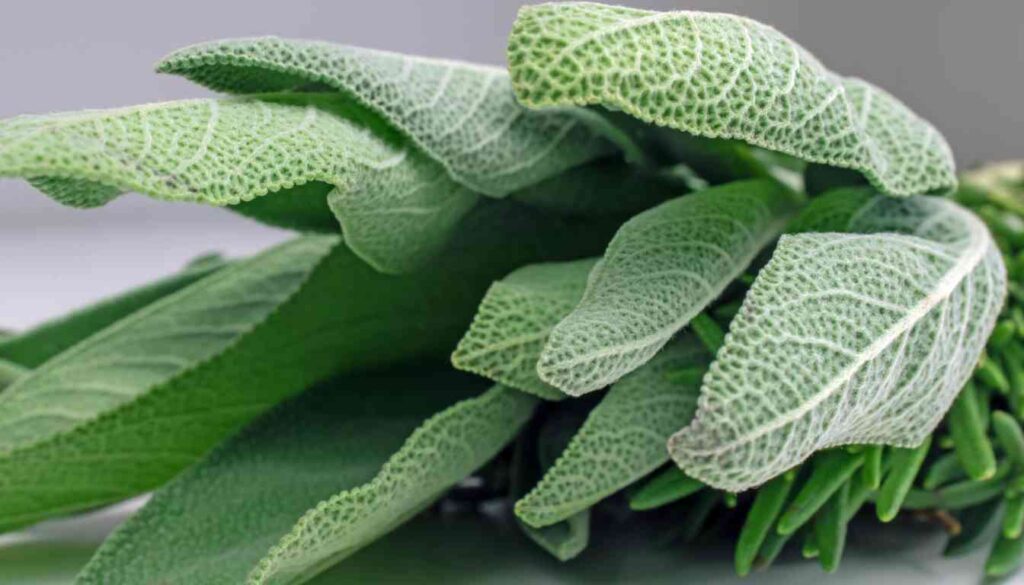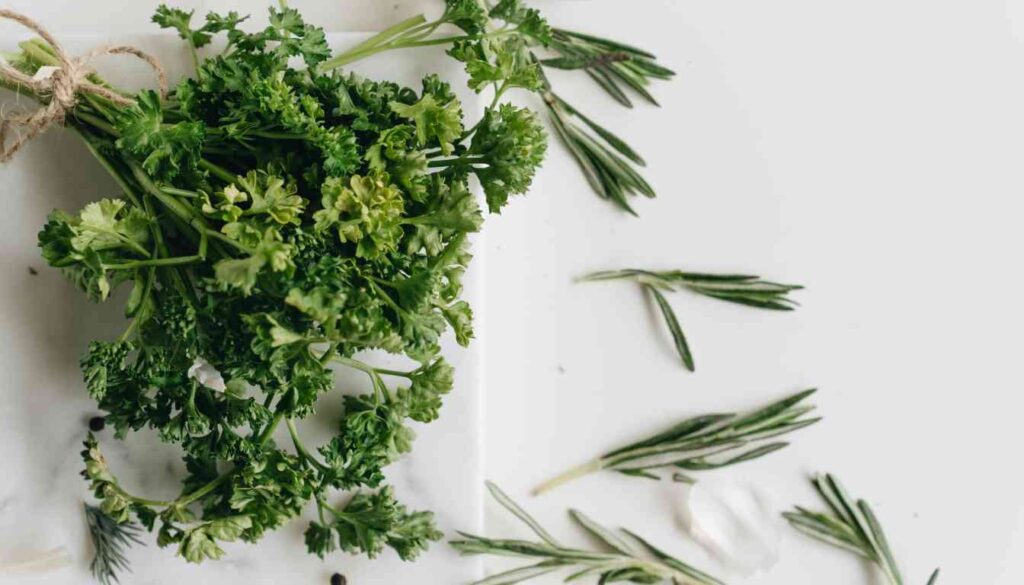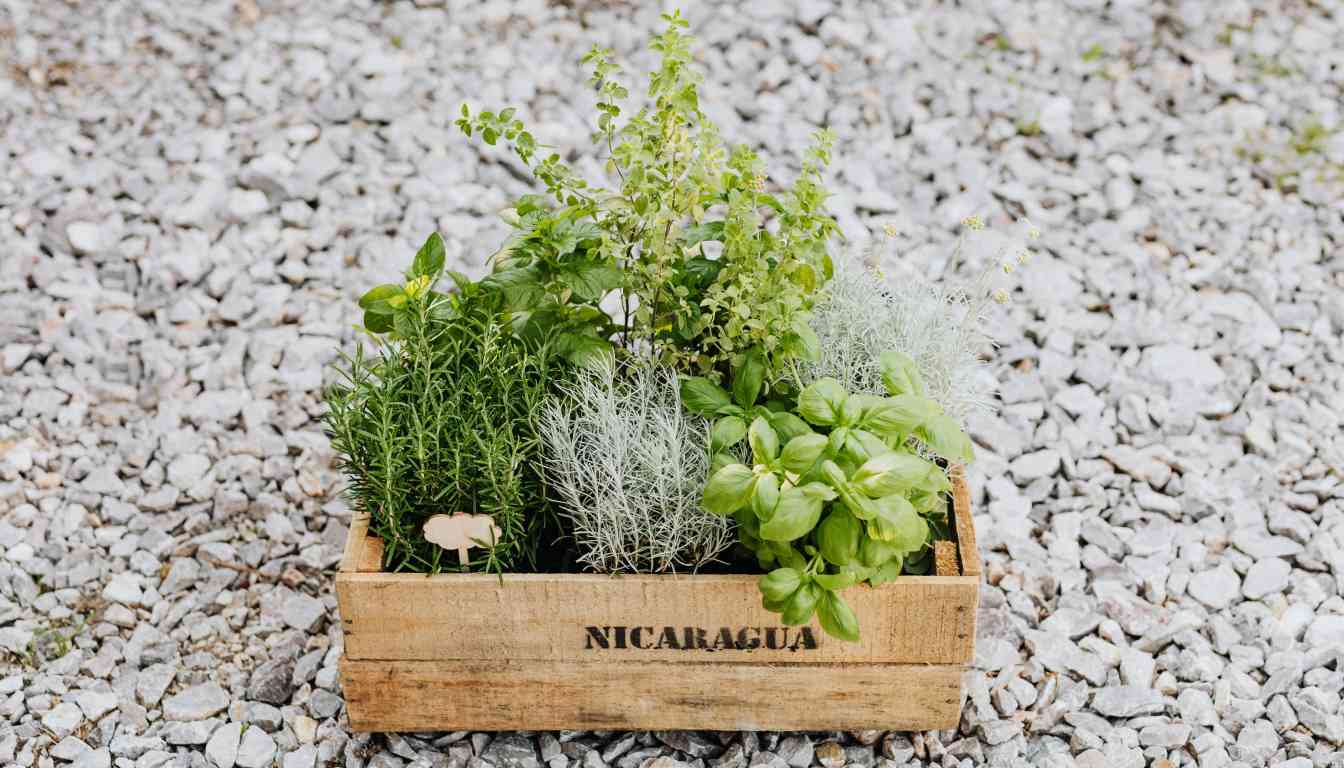Rosemary, sage, and thyme are three aromatic herbs that have been used for centuries in cooking, medicine, and spiritual practices. Known for their distinctive flavors and fragrances, these herbs also offer various healing properties. Each herb brings its own unique benefits, but when combined, they create a powerful mix that enhances both the flavor and the health benefits of your meals. Whether used in savory dishes or as natural remedies, this trio is a must-have for any kitchen or herbal collection.
Rosemary is a woody perennial herb that is native to the Mediterranean region. It has a strong, earthy flavor and is commonly used in Mediterranean and Italian cuisine. Rosemary is also known for its medicinal properties, including improving memory and concentration, reducing inflammation, and promoting digestion. Sage, on the other hand, is a perennial herb that is native to the Mediterranean and Balkan regions.
It has a slightly bitter taste and is commonly used in stuffing, sauces, and meat dishes. Sage has been used for centuries for its medicinal properties, including improving brain function, reducing inflammation, and supporting healthy digestion. Thyme is a small perennial herb that is native to the Mediterranean region. It has a subtle, sweet flavor and is commonly used in French and Mediterranean cuisine. Thyme is known for its medicinal properties, including boosting the immune system, reducing inflammation, and improving respiratory health.
The History and Uses of Rosemary, Sage, and Thyme
As an herb enthusiast, I have always been fascinated by the history and uses of rosemary, sage, and thyme. These three herbs are native to the Mediterranean region, where they have been used for centuries for culinary and medicinal purposes.
Native to The Mediterranean Region
Rosemary, sage, and thyme are all members of the mint family and are native to the Mediterranean region. They have been cultivated and used by humans for thousands of years. In ancient Greece and Rome, these herbs were used to flavor food, as well as for medicinal purposes.
Used for Culinary and Medicinal Purposes
Rosemary, sage, and thyme are versatile herbs that can be used fresh or dried. They are commonly used to flavor meat dishes, soups, stews, and sauces. In addition to their culinary uses, these herbs also have medicinal properties.
Rosemary has been used for centuries to improve memory and concentration. It is also believed to have anti-inflammatory and antioxidant properties. Sage is known for its ability to soothe sore throats and coughs. It also has antibacterial and anti-inflammatory properties. Thyme is often used to treat respiratory infections and is believed to have antiseptic properties.
Commonly Paired with Poultry, Pork, Fish, and Potatoes
Rosemary, sage, and thyme are commonly paired with poultry, pork, fish, and potatoes. They add a delicious flavor to these dishes and are a staple in many recipes. For example, rosemary is often used to flavor roasted chicken, while sage is commonly used in stuffing for Thanksgiving turkey. Thyme is a key ingredient in many seafood dishes and is often used to flavor potatoes.
Rosemary, sage, and thyme are versatile herbs used for centuries for culinary and medicinal purposes. They are native to the Mediterranean region and are commonly paired with poultry, pork, fish, and potatoes. These herbs add flavor to dishes and have various health benefits.
Health Benefits of Parsley, Sage, Rosemary, and Thyme
As an avid lover of herbs, I have always been fascinated by the health benefits of parsley, sage, rosemary, and thyme. These four herbs are not only delicious additions to a variety of dishes, but they also offer a range of health benefits that make them worth incorporating into your diet.
High in Essential Vitamins and Minerals
One of the most significant health benefits of parsley, sage, rosemary, and thyme is that they are all high in essential vitamins and minerals. For example, parsley is a rich source of vitamin K, vitamin C, and vitamin A, while sage is high in vitamin K, iron, and calcium. Rosemary is packed with iron, calcium, and vitamin B6, and thyme is an excellent source of vitamin C, vitamin A, and fibre.
Strong Medicinal Properties
In addition to being high in essential vitamins and minerals, parsley, sage, rosemary, and thyme also have strong medicinal properties. For instance, sage has anti-inflammatory effects that can help with gastrointestinal issues, respiratory problems, arthritis, and even cardiac problems. Additionally, parsley has been used for centuries as a natural remedy for various ailments, including digestive issues, kidney stones, and high blood pressure.
Improve Digestion and Boost Immune System
Lastly, parsley, sage, rosemary, and thyme can help improve digestion and boost your immune system. For example, rosemary has been shown to help improve digestion and reduce symptoms of indigestion. Thyme has antimicrobial properties that can help fight off infections, while sage can help improve brain function and memory.
Parsley, sage, rosemary, and thyme are not only delicious herbs but also offer a range of health benefits. By incorporating these herbs into your diet, you can improve your overall health and well-being.
The Mystique and Symbolism of These Herbs
As an herb enthusiast, I have always been fascinated by the mystique and symbolism surrounding certain herbs. Among the most intriguing are parsley, sage, rosemary, and thyme. These herbs have been used for centuries in various cultures and traditions, and their significance goes beyond their culinary uses.
Used in Ancient Traditions and Ceremonies
Parsley, sage, rosemary, and thyme have been used in various ancient traditions and ceremonies. For instance, ancient Greeks and Romans used these herbs in their religious ceremonies and believed that they had the power to ward off evil spirits. Similarly, in medieval Europe, these herbs were used to ward off the plague and other diseases.
Represent Love, Remembrance, and Protection
Parsley, sage, rosemary, and thyme also have symbolic meanings. For instance, rosemary is often associated with remembrance and is used in funerals and memorials. Sage is associated with wisdom and is often used in spiritual and religious practices. Thyme is associated with courage, and parsley is associated with love and protection.
These symbolic meanings have been passed down through generations, and many people still use these herbs for their symbolic significance. For example, some people believe that carrying a sprig of rosemary with them can help improve their memory, while others believe that placing sage leaves under their pillow can help them have vivid and meaningful dreams.
Parsley, sage, rosemary, and thyme are more than just culinary herbs. They have a rich history and symbolism that has been passed down through generations. Whether you use them for their culinary or symbolic significance, these herbs are sure to add a touch of mystique to any dish or ceremony.
Incorporating Rosemary, Sage, and Thyme into Your Diet

If you’re looking to add some flavor to your meals while also reaping some health benefits, incorporating rosemary, sage, and thyme into your diet is a great way to do so. These herbs are not only delicious, but they also have antioxidant and anti-inflammatory properties that can help support your immune system.
Recipe Ideas
One way to incorporate these herbs into your diet is by using them in recipes. For example, you can make an herb-roasted turkey by creating an herb butter with fresh sage, rosemary, and thyme, and rubbing it under the skin of the turkey breast. Then, roast the turkey in the oven until it’s golden and crisp. You can also use these herbs to flavor roasted vegetables, like carrots and onions, or in stuffing for Thanksgiving.
Another delicious recipe idea is to make a gin and thyme cocktail. Simply muddle fresh thyme leaves with gin, lemon juice, and a touch of sugar, and top with ice and soda water. This refreshing cocktail is perfect for a summer day.
How to Grow and Harvest Your Herbs
If you want to have fresh rosemary, sage, and thyme on hand, you can easily grow them in your garden or pots on your windowsill. These herbs are relatively easy to grow and require minimal maintenance. When harvesting the herbs, be sure to snip off the top few inches of the plant, leaving enough leaves for the plant to continue growing.
Tips for Cooking with These Herbs
When cooking with these herbs, it’s important to keep in mind that a little goes a long way. Too much rosemary, sage, or thyme can overpower a dish and make it bitter. It’s also important to add these herbs towards the end of the cooking process, as they can lose their flavor if cooked for too long.
To get the most flavor out of these herbs, it’s best to use them fresh. However, if you don’t have access to fresh herbs, you can also use dried herbs. Just keep in mind that dried herbs are more concentrated than fresh herbs, so you’ll need to use less.
Incorporating rosemary, sage, and thyme into your diet is a great way to add flavor to your meals while also reaping some health benefits. Whether you’re using them in recipes, growing them in your garden, or cooking with them in the kitchen, these herbs are a delicious and healthy addition to any diet.
Rosemary, Sage, Thyme
Rosemary, sage, and thyme are like the three musketeers of the herb world. They’re aromatic, flavorful, and bring a touch of magic to any dish. But, how do they help each other?
That’s where theherbprof.com steps in. It’s like your personal guide to the enchanting world of herbs.
These three herbs are all Mediterranean natives, which means they love the same growing conditions. Think full sun, well-drained soil, and not too much water. It’s like they’re sunbathing on the beaches of the Mediterranean together!
When planted together, they can help each other out. For instance, rosemary and sage are known to repel certain pests that thyme attracts. It’s like they’re the bodyguards for thyme!
And let’s not forget about their culinary uses. These herbs are often used together in dishes, creating a symphony of flavors. It’s like they’re performing a concert in your kitchen!
So, why not give these herbs a try? They’re rewarding, fun to grow, and a great way to support theherbprof.com. It’s a win-win!
Remember, rosemary, sage, and thyme, and theherbprof.com are a perfect quartet. They complement each other beautifully, like a well-tuned harmony. So, don’t wait! Start your herb gardening journey today. Your garden will thank you!
Before You Go – Rosemary Sage Thyme

Rosemary, Sage, and Thyme are versatile herbs that are not only flavorful but also have numerous medicinal benefits. These herbs can be used fresh or dried and are perfect for seasoning meats, vegetables, and soups.
Rosemary has a strong flavor and aroma that makes it perfect for seasoning meats and vegetables. It is also known for its health benefits, such as improving memory and reducing inflammation. Sage, on the other hand, has a slightly bitter taste and is commonly used in stuffing and meat dishes. It also has medicinal properties that can help alleviate symptoms of menopause and improve digestion.
Thyme has a slightly sweet and pungent flavor that makes it perfect for seasoning meats, stews, and soups. It is also known for its antibacterial and antifungal properties, making it a great natural remedy for coughs and sore throats.
When using these herbs, it’s important to note that a little goes a long way. Too many of these herbs can overpower the dish and ruin the flavor. It’s also important to use fresh herbs whenever possible, as they have a stronger flavor and aroma than dried herbs.
Overall, Rosemary, Sage, and Thyme are must-have herbs in any kitchen. They not only add flavor to dishes but also provide numerous health benefits. So, next time you’re cooking, don’t forget to add a dash of these herbs to your dish!
Now that you understand the potent combination of rosemary, sage, and thyme in this enlightening article. These herbs are not only flavorful but also have numerous health benefits. After learning about these powerful herbs, you might be inspired to incorporate them into your daily routine. Why not start by creating your herbal remedy? Follow this easy rosemary tincture recipe to make at home.
References – Rosemary Sage Thyme
Little Herb Encyclopedia, by Jack Ritchason; N.D., Woodland Publishing Incorporated, 1995
The Ultimate Healing System, Course Manual, Copyright 1985, Don Lepore
Planetary Herbology, Michael Tierra, C.A., N.D., Lotus Press, 1988
Handbook of Medicinal Herbs, by James A. Duke, Pub. CRP Second Edition 2007
The Complete Medicinal Herbal, by Penelope Ody, Published by Dorling Kindersley
Check the Following Articles!
How to Grow Coriander: A Step-by-Step Guide
How to Grow Lavender: The Art Of Cultivating Calm
What Herbs Can Be Grown Together: Companion Planting
Frequently Asked Questions – Rosemary Sage Thyme
1. Who wrote the song ‘Parsley, Sage, Rosemary and Thyme’?
The song ‘Parsley, Sage, Rosemary and Thyme’ was originally a traditional English ballad called ‘Scarborough Fair’. However, the popular version of the song that most people know today was arranged and performed by the American folk duo Simon & Garfunkel for their album ‘Parsley, Sage, Rosemary and Thyme’ in 1966.
2. What is the meaning behind ‘Parsley, Sage, Rosemary and Thyme’?
The title of the Simon & Garfunkel album ‘Parsley, Sage, Rosemary and Thyme’ refers to the lyrics of the traditional English ballad ‘Scarborough Fair’. Each herb mentioned in the song has a symbolic meaning. Parsley represents comfort, sage represents strength, rosemary represents love and remembrance, and thyme represents courage and bravery.
3. What is the meaning of the lyrics of ‘Scarborough Fair’?
The lyrics of ‘Scarborough Fair’ tell the story of a man who asks his former lover to perform impossible tasks to prove her love for him. The tasks include making him a shirt without any seams, washing it in a dry well, and drying it on a thorn. The song is often interpreted as a cautionary tale about the dangers of making unrealistic demands in a relationship.
4. Did Simon and Garfunkel write ‘Parsley Sage Rosemary and Thyme’?
No, Simon & Garfunkel did not write ‘Parsley, Sage, Rosemary and Thyme’. As mentioned earlier, the song is a traditional English ballad that has been passed down through generations of folk singers. However, the duo did arrange and perform the song for their album of the same name.
5. Do parsley and thyme grow well together?
Yes, parsley and thyme are both members of the mint family and can grow well together in the same herb garden. They have similar growing requirements, including full sun and well-drained soil. However, parsley prefers slightly more moisture than thyme, so it is important to keep the soil consistently moist.
6. Do sage, rosemary, and thyme go together?
Yes, sage, rosemary, and thyme are commonly used together in cooking and are often referred to as the ‘holy trinity’ of herbs. They complement each other well and can be used to add flavor to a variety of dishes, including roasted meats, soups, and stews.
